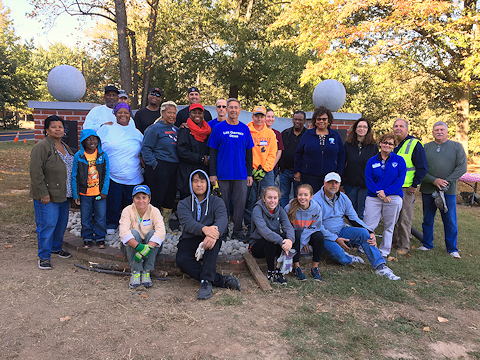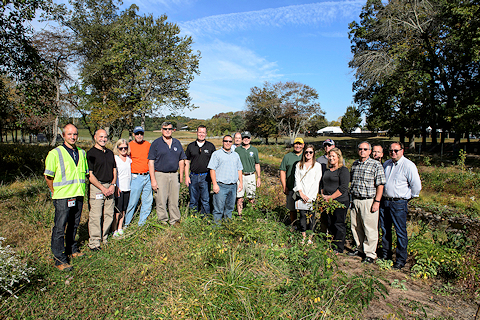Alert:
| Path | Authored on | Image Path | Image Anchor | ||||
|---|---|---|---|---|---|---|---|
| Ribbon-Cutting Marks Opening of New Burke Lake Golf Clubhouse |
The 4,200-square foot clubhouse boasts a modernized pro shop, updated kitchen and dining area, enhanced food and beverage options and patio overlooking the golf course. The patio was specifically placed on the northeast side of the clubhouse and away from the hot, setting sun so that summer outings can end with comfortable outdoor dining. Pictured at the ribbon cutting are Peter Murphy, Springfield District Planning Commissioner; Tim Hackman, Dranesville District Representative, Park Authority Board; Steve Thormahlen, Chair, Fairfax County Park Foundation; Ron Kendall, Mason District Representative, Park Authority Board; Pat Herrity, Springfield District Representative, Board of Supervisors; Mike Thompson, Springfield District Representative, Park Authority Board; Lewis Musolf, Burke Lake Golf General Manager, Park Authority; Stephen Williamson, Vice President/New Construction, ADI Construction of Virginia); Mike Belefski, former Park Authority Board Member; Dave Bowden, Park Authority Director of Planning & Development; Todd Johnson, Golf Enterprises Division Manager, Park Authority; Roberta Korzen, Golf Marketing Specialist, Park Authority; Eric Inman, Planning & Development Project Manager, Park Authority; along with site staff and golf enthusiasts. See more photos at: https://www.flickr.com/photos/ffxparks/albums/72157689244646111 |

|
Read full article | {{ f00UTCWednesday06_p000000bWednesday000012060000pWednesdaypm1706pm31UTC }} | /parks/sites/parks/files/Assets/images/Cutlines/2017-ctl27-tmb.jpg | 0 | |
| Community Celebrates Opening of South Run Playground |
A ribbon-cutting ceremony was held at the new playground at South Run District Park on Saturday, September 16, 2017 to mark completion of the new playground in Springfield, VA. The park’s old playground was demolished to make way for a new play area that features a playground, tot lots, sun shading and an upgraded ADA accessible route. As part of the playground and tot lot replacement, sidewalks through and adjacent to the playground were upgraded and shades over each play area were replaced. The $420,000 project also included a timber border, safety surfacing, drainage, benches and fencing. Work was funded through the 2012 Park Authority Bond. Pictured from left to right are Mike Thompson, Park Authority Board Secretary and Springfield District Representative; Dave Bowden, Director, Park Authority Planning & Development; Dave Fallert, Manager, South Run RECenter; and Sara Baldwin, Acting Executive Director, Park Authority. They are joined by children and parents celebrating the new playground. See more photos at: https://www.flickr.com/photos/ffxparks/albums/72157685383892382 |

|
Read full article | {{ f00UTCThursday21_p000000bThursday000012210000pThursdaypm1721pm30UTC }} | /parks/sites/parks/files/Assets/images/Cutlines/2017-ctl20-tmb.jpg | 0 | |
| American Pride on Display in New Lee District RECenter Mural |
A new mural at the Lee District RECenter natatorium was officially unveiled on Thursday, September 28, 2017. This sweeping mural shows the grandeur of the nation’s Capital and pays homage to veterans. Artist Tim Grant painted this mural during the RECenter’s summer 2017 maintenance closure. His work can be found in parks throughout Fairfax County. Mr. Grant is an avid outdoorsman and says “I want my kids to inherit a healthy earth and be able to experience our country the way that I have: from the smallest details to the most stunning vistas - a breathtaking source of unlimited inspiration.” Pictured from left to right are Dan Peters, Manager, Lee District RECenter; Tammy Yelmgren, Aquatics Assistant Supervisor, Lee District RECenter; Amy Kellett, artist’s family member; Jeff McKay, Board of Supervisors, Lee District Representative; Tim Grant, Artist; Keeka Grant, artist’s family member; Aimee Vosper, Deputy Director, Fairfax County Park Authority; Carolyn Banks, Community Advocate; and Dr. Cynthia Jacobs Carter, Park Authority Board, Lee District Representative. See more photos at: https://www.flickr.com/photos/ffxparks/albums/72157687247826164 |

|
Read full article | {{ f00UTCFriday29_p000000bFriday000012290000pFridaypm1729pm30UTC }} | /parks/sites/parks/files/Assets/images/Cutlines/2017-ctl21-tmb.jpg | 0 | |
| Volunteers Improve Banks Park for National Public Lands Day |
On Saturday, September 30, 2017, more than 25 volunteers participated in a work day at Olander and Margaret Banks Neighborhood Park in Alexandria, Virginia as part of National Public Lands Day (NPLD). Local residents, members of the Banks Family, Park Authority staff members, Dr. Cynthia Jacobs-Carter (Lee District Representative on the Park Authority Board) and Park Board Vice Chairman Mary Cortina gathered for a commemorative photo. Volunteers spent the morning painting bollards, removing landscape timbers, laying stone, pruning shrubs, raking, mulching and helping with other park beautification projects. The Olander and Margaret Banks Neighborhood Park includes approximately 10 acres of land in the Kingstowne area where opportunities for new, publicly-accessible open space are few and far between. The site is characterized by a mixture of open lawn areas, mature canopy trees and a stream that bisects the property. The National Environmental Education Foundation’s (NEEF) National Public Lands Day is the nation's largest, single-day volunteer effort for public lands and aims to connect people to public lands in their community, inspire environmental stewardship, and encourage use of public lands for education, recreation, and general health. |

|
Read full article | {{ f00UTCWednesday04_p000000bWednesday000012040000pWednesdaypm1704pm31UTC }} | /parks/sites/parks/files/Assets/images/Cutlines/2017-ctl22-tmb.jpg | 0 | |
| Parks and DPWES Mark Completion of Colvin Run Stream Restoration |
On, Friday, Oct. 6, 2017, leaders from the Fairfax County Park Authority and the Fairfax County Department of Public Works and Environmental Services joined contractors and residents for a tour of the recently completed stream restoration project in Lake Fairfax Park. The project team discussed the benefits to the park and surrounding environment, which include reduced flooding hazards, higher water quality, a new vehicular bridge, a stabilized pedestrian bridge, and access points for environmental education programs. The first phase of a stream restoration project restored 2,220 feet of Colvin Run, a tributary of Difficult Run, which drains into the Potomac River. This was a joint project completed by the Fairfax County Department of Public Works and Environmental Services (DPWES) and the Fairfax County Park Authority. Pictured in the photo, from left to right: Matthew Kaiser, information officer, DPWES; Vince Martucci, branch chief, Utilities Design and Construction Division, Capital Facilities, DPWES; Joanne and Ron Wallos, park neighbors; Wayne Brissey, Area 6 Manager, Park Authority; Brian Chromey, Wet Studies and Solutions, Inc.; J.T. Kelley, WSSI; Bart Cowne, Avon Corp.; Tim Hackman, Dranesville District representative, Park Authority Board; Bill Bouie, chairman, Park Authority Board; Katie Fordney, GeoConcepts Engineering, Inc.; Michael Freund, Engineering Technician, Stormwater Planning Division, DPWES; Sara Baldwin, acting executive director, Park Authority; Jay Horstman, senior engineer, Utilities Design and Construction Division, CAP, DPWES; Charles Smith, central branch chief, Watershed Projects Implementation, Stormwater Planning Division, DPWES; and Dave Bowden, director, Planning and Development Division, Park Authority. |

|
Read full article | {{ f00UTCThursday12_p000000bThursday000012120000pThursdaypm1712pm31UTC }} | /parks/sites/parks/files/Assets/images/Cutlines/2017-ctl23-tmb.jpg | 0 | |
| Tysons Park Renamed for Former Planning Commissioner Ken Lawrence |
On, Saturday, October 14, 2017, current and former Fairfax County leaders joined family and friends to rename a Tysons park in honor of former Fairfax County Planning Commissioner Ken Lawrence, who passed away in December 2016. Jones Branch Fields and Arbor Row Stream Valley Park were consolidated and renamed Ken Lawrence Park in honor of the former Providence District Planning Commissioner and longtime advocate for parks, fields and open space in Fairfax County. His vision for Tysons sought balance between growth and infrastructure and he was a major influence in getting green space added to the Tysons Urban Center Comprehensive Plan, which will guide development of Tysons’ recreational amenities now and in the future. Pictured in the photo, from left to right: (LEFT SIDE) Philip Niedzielski-Eichner, Providence District Planning Commissioner; Jay Donohue, former Fairfax County Planning Commissioner; Tasso Flocos, Cityline; James Migliaccio, Lee District Planning Commissioner; John Litzenberger, Former Fairfax County Planning Commissioner; Tom Fleury, formerly of Cityline; Tim Sargeant, At-Large Planning Commissioner; Jill Cooper, Fairfax County Planning Commission Director; John Ulfelder, Dranesville District Planning Commissioner; Fred Selden, Director of Fairfax County Planning & Zoning; Peter Murphy, Springfield District Planning Commissioner; Janyce Hedetniemi, At-Large Planning Commissioner; Sara Baldwin, Park Authority Acting Executive Director; Ken Quincy, Providence District Representative for Park Authority Board; Andi Dorlester, Park Authority Planning Manager; Walter Acorn, At-Large Representative for Park Authority Board (RIGHT SIDE) Lawrence family members along with Tim Eakin Walsh, Fairfax County Park Foundation Board of Directors; Linda Q. Smyth, Providence District Supervisor, Fairfax County Board of Supervisors; Dave Bowden, Park Authority Director of Planning & Development; James R. Hart, At-Large Planning Commissioner; Lynne Strobel, Colucci, Lubeley & Walsh; Jim Zook, former Director of Fairfax County Department of Planning & Zoning. See more photos at: https://www.flickr.com/photos/ffxparks/albums/72157661551575478 |

|
Read full article | {{ f00UTCWednesday18_p000000bWednesday000012180000pWednesdaypm1718pm31UTC }} | /parks/sites/parks/files/Assets/images/Cutlines/2017-ctl24-tmb.jpg | 0 | |
| County Leaders Welcome New Owners at Historic Oak Hill's Open House |
On, Saturday, October 21, 2017, Historic Oak Hill in Annandale opened its doors to the public for its annual Open House. Members of the Fairfax County Board of Supervisors and the Fairfax County Park Authority welcomed new owners Joe and Laura Braceland to the neighborhood presenting them with a copy of the “Taste of Braddock” book and flowers. Oak Hill is an 18th-century Georgian-style mansion, and it is all that remains of the Ravensworth Tract that dates back to the 1670s and once totaled more than 22,000 acres. Today, the home is privately owned but protected through an historic easement requiring that the property and its grounds be open to the public each year. Pictured left to right: Sharon Bulova, Chairman, Fairfax County Board of Supervisors; Aimee Vosper, Deputy Director, Fairfax County Park Authority; Joe and Laura Braceland, current Oak Hill owners; Scott and Dakota Springston, descendants of William Fitzhugh, the Immigrant (original owner of the Ravensworth Tract); Supervisor John Cook, Braddock District Representative, Fairfax County Board of Supervisors. See more photos at: https://www.flickr.com/photos/ffxparks/albums/72157665410572009 |

|
Read full article | {{ f00UTCWednesday25_p000000bWednesday000012250000pWednesdaypm1725pm31UTC }} | /parks/sites/parks/files/Assets/images/Cutlines/2017-ctl25-tmb.jpg | 0 | |
| Dorothy McAuliffe Visits Reston Farmers Market for Check Presentation |
On, Saturday, October 28, 2017, Virginia First Lady Dorothy McAuliffe was on hand at the Reston Farmers Market as Anthem Blue Cross and Blue Shield (Anthem) President Patrick Sturdivant presented a $15,000 check to the Wholesome Wave “VA Fresh Match Program.” Anthem staff also volunteered at the market by assisting with setup, packing and loading food and helping with family activities such as pumpkin painting. Wholesome Wave is a chef-founded national non-profit that has perfected and championed “nutrition incentives” for the past 10 years. The VA Fresh Match Program is a statewide network of 60 farmers markets that double the value of SNAP, up to $20, when spent on fresh fruits and vegetables. This helps SNAP shoppers afford healthy choices while increasing sales for local farmers and keeping funds in the area economy. The $15,000 will be doubled by the US Department of Agriculture. The Reston Farmers Market is one of 11 farmers markets operated by volunteers on behalf of the Fairfax County Park Authority. By providing access to locally grown foods, Fairfax County’s farmers market program strives to improve the health of Fairfax County citizens, support local food producers, and protect the environment. Pictured left to right: (Back Row): Chelsea Roseberry, Farmers Market Coordinator, Fairfax County Park Authority; Fran Lovaas, Reston Market Manager;Bill Bouie, Chairman, Park Authority Board; Kenneth Plum, Virginia House of Delegates, 36th District; Hunter Mill District Supervisor Cathy Hudgins, Fairfax County Board of Supervisors; Dr. Sonny Ramaswamy, Director, USDA National Institute for Food and Agriculture;Janet Howell, Virginia Senate, 32nd District; Patrick Sturdivant, President, Anthem HealthKeepers Plus; Dorothy McAuliffe, Virginia First Lady; Michel Nischan, Founder & CEO, Wholesame Wave; Cathal Armstrong, Chef, Restaurant Eve; Rodney Taylor, Nutrition Director, Fairfax County Public Schools; John Lovaas, Reston Market Manager. (Front Row): Anthem staff and volunteers See more photos at: https://www.flickr.com/photos/ffxparks/albums/72157690056762456 |

|
Read full article | {{ f00UTCTuesday31_p000000bTuesday000012310000pTuesdaypm1731pm31UTC }} | /parks/sites/parks/files/Assets/images/Cutlines/2017-ctl26.jpg | 0 |